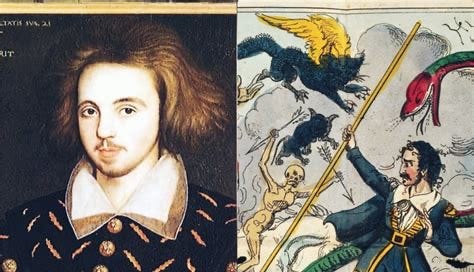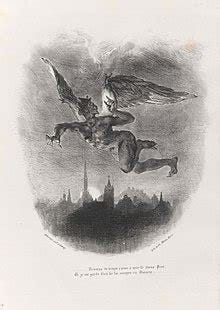In a small German town, there lived a renowned scholar named Johann Faust. Despite his exceptional intellect and vast knowledge, Faust grew weary of the limitations of human understanding. He yearned to delve into forbidden realms, to unravel the mysteries of the universe that lay beyond mortal comprehension.
One fateful evening, consumed by his thirst for knowledge, Faust retired to his study. Deep in contemplation, he voiced his desire for enlightenment, summoning the forces beyond the natural world. And to his astonishment, a dark figure materialized before him—Mephistopheles, a devilish being with piercing eyes and a sinister grin.
The demon presented Faust with an irresistible offer: unlimited knowledge and power in exchange for his immortal soul. Temptation gripped Faust's heart as he pondered the immense possibilities that lay before him. The scholar hesitated, aware of the consequences, but his curiosity and ambition overcame his reservations.
Faust made the pact, sealing his destiny. From that moment onward, he embarked on a journey beyond the boundaries of human experience. Mephistopheles became his guide, leading him through the realms of forbidden knowledge, granting him incredible insights and abilities.
At first, Faust reveled in his newfound power. He delved into fields of study that were once incomprehensible to him, unraveled the secrets of the stars, and unlocked the deepest truths of existence. He became renowned throughout the land, admired for his intellect and accomplishments.
But as time passed, Faust's insatiable thirst for knowledge grew. He no longer desired simple answers; he craved the essence of life itself. Mephistopheles, ever the cunning companion, urged him onward, promising to fulfill even his wildest desires.
In his quest for ultimate understanding, Faust turned to darker pursuits. He delved into forbidden arts, dabbling in necromancy and black magic. He sought to control the forces of life and death, to bend the universe to his will. However, with each step, he felt his humanity slipping away.
Faust's descent into darkness was not without consequences. The townspeople grew suspicious of his actions, sensing the malevolent energy that emanated from him. They whispered rumors and spread tales of his pact with the devil.
Faust's soul, burdened by guilt and remorse, longed for redemption. He realized that the path he had chosen had led him astray from his original purpose. In a moment of clarity, he renounced his pact with Mephistopheles, yearning to reclaim his humanity and seek forgiveness for his sins.
Enraged by Faust's defiance, Mephistopheles unleashed his wrath. He unleashed a tempest of chaos upon the land, seeking to claim Faust's soul once and for all. But Faust, armed with newfound resolve, faced the demon with courage and resilience
In a final confrontation, Faust confronted Mephistopheles and defied his malevolence. With a pure heart and unwavering conviction, Faust embraced his mortality and relinquished his pursuit of forbidden knowledge.
In that moment, the earth trembled, and a blinding light engulfed the room. Mephistopheles was banished, defeated by Faust's unyielding spirit. The scholar had found redemption, sacrificing his desire for enlightenment to reclaim his soul.
Faust returned to the town, a changed man. He dedicated himself to serving the community, sharing his knowledge to uplift and inspire others. He sought forgiveness for his past transgressions, spreading wisdom and compassion wherever he went.
And so, Johann Faust's story became a cautionary tale—a reminder of the dangers of unchecked ambition and the fragility of the human soul. The townspeople, once wary of Faust, witnessed his transformation and found solace in his teachings. They learned from his mistakes and embraced the importance of humility, morality, and the pursuit of knowledge within ethical bounds.
Faust spent his remaining years immersed in a life of service, sharing his wisdom and guiding others towards a path of enlightenment. His lectures and writings became renowned for their profound insights and moral lessons, touching the hearts and minds of all who encountered them.
As Faust's end drew near, he was surrounded by those he had helped and inspired. With his final breath, he imparted his most valuable lesson: the pursuit of knowledge should always be tempered by wisdom and compassion, for it is through the understanding of our interconnectedness and the nurturing of the human spirit that true enlightenment is achieved.
The legacy of Johann Faust lived on long after his passing. His story became a timeless reminder of the eternal struggle between temptation and redemption, ambition and humility. Scholars and storytellers passed down his tale through generations, ensuring that the lessons learned from his mistakes would never be forgotten.
In every corner of the world, those who heard the story of Faust pondered the choices they made in their own lives. They reflected upon the importance of staying true to one's principles, of recognizing the value of one's soul above all worldly desires.
And so, the story of Faust continued to echo through the ages, reminding humanity of the delicate balance between the pursuit of knowledge and the preservation of one's humanity. It served as a cautionary tale, a beacon of hope, and a testament to the enduring power of redemption.
Faust's journey, fraught with both triumphs and tribulations, became a timeless parable—a testament to the human capacity for growth and transformation. The name Faust became synonymous with the eternal struggle of the human spirit, forever etched in the annals of history as a reminder of the choices we make and the consequences they entail.
And thus, the tale of Faust, a man who sold his soul to the devil and found redemption in the face of temptation, became an enduring emblem of the triumph of the human spirit over the forces of darkness.








